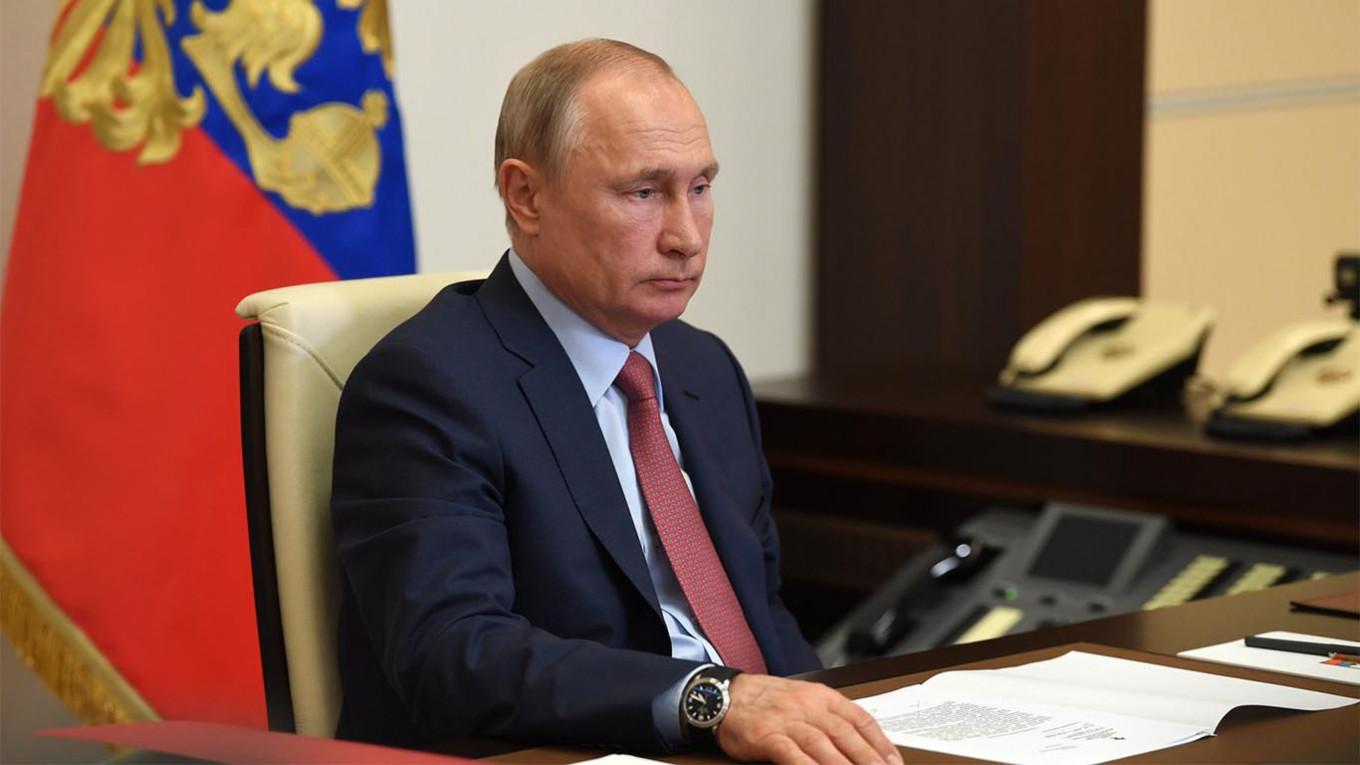In the closing days of May 2020, at the peak of the coronacrisis and political uncertainty, state-controlled TV decided for reasons known only to itself to air an interview with Vladimir Putin that was filmed back in September 2019.
In Russian political jargon, this is known as “canned goods” or “preserves” and it has become a familiar part of Russia’s postmodern political landscape: no one knows exactly when the footage of Putin that appears on the evening news was actually filmed — that day, that week or that month. As you watch the Russian President conversing with a top official on your screen, he might, at that moment, actually be far away on a fishing trip, sitting in a bunker somewhere, in bed with a cold, solving a crossword puzzle or just gazing out the window.
But why did they dust off this particular archival interview now? It records Putin as saying, “Russia is not just a country, but a distinct civilization thanks its rich traditions, multiethnic character and numerous cultures and faiths.” For this reason, he argues, Russia must develop modern technologies that will enable this civilization to achieve breakthroughs.
Why did this interview go from passed time to primetime? Keep in mind that such things do not happen by accident in today’s Russia. A non-descript official somewhere doubtless had to grant permission for it to air. So let’s try to reconstruct the rationale for this decision.
From a tactical viewpoint, arguments about a “distinct Russian civilization” and certain high technologies that are soon to appear fit in perfectly with the narrative the authorities have invented for talking about the coronavirus.
Why are there abnormally few coronavirus deaths in Russia? Because this is a special civilization.
Why did Russia hold off on providing financial assistance to its citizens, and later give only a pittance — and that only to families with children? Because this is a special civilization. Soon, this country’s scientists will develop a miracle cure for Covid-19 and Russia will once again show the world.
The 19th-century Russian satirist Mikhail Saltykov-Shchedrin captured this approach perfectly when he wrote, “They started going heavy on the patriotism, which means they got caught embezzling.”
Everyone is more or less aware that the official statements are a disingenuous attempt to cover up some glaring injustice. Leaders have not paid doctors the promised emergency benefits and cannot even distribute masks to citizens free of charge, but this does not matter because Russia is a distinct civilization.
However, it is important to note that even if the average Russian understands that the authorities are “going heavy on the patriotism” and filling the airwaves with empty statements about a “distinct civilization,” it does not mean that people basically disagree with that idea.
For far too long this country has cultivated the idea that Russia and the Russian people are “uniquely unique.”
This is not like the Jewish people who view themselves as the “chosen people” or even how early U.S. settlers and recent politicians have cited Scripture in referring to that country as a “shining city upon a hill.” It is something that has never been formulated fully but that every person living in Russia understands clearly.
A detached and clinical description of this attitude would not do it justice. It most closely resembles the psychology of a teenager who is convinced that no one in the entire world could possibly have the same problems as he does and that no one could possibly understand him.
And this psychology, with only rare intervals, has been cultivated in Russia for the last 500 years.
It began when Ivan the Terrible’s grandfather married a Byzantine princess and his scribes came up the idea that Russia was the third Rome — implying that the civilizations of Rome itself and of Constantinople as the “second Rome” had collapsed.
At various times and for various objectives, Russia has been “the only Russian Orthodox kingdom” and “the only truly communist country.”
The key word here, of course, is “only” in the sense of “unique,” “special” and, yes, “unequalled.” The Russian authorities have alternately concocted ideas about national character and spirituality, Leninism and “Big Brotherhood.” Now, national character and spirituality are back in vogue. Whatever its name, the basic idea has never changed.
Belief in this exclusivity runs deep in the Russian psyche. Even Russian liberals and pro-Westerners share the belief that Russia is unique.
But whereas most of their compatriots see it as uniquely good, they see it as uniquely bad — “for its despotism and enslavement of the citizenry.” Still, even they do not dispute that Russia is strangely unique: “a uniquely negative example,” they might say, “an object lesson for the whole world.”
This idea of specialness pops up everywhere, from Russian proverbs such as “What’s good for a Russian could kill a German” to movies, poems and jokes.
But, instead of trying to move beyond this eons-old adolescent mindset, the Russian authorities just keep on exploiting it. Why? Because it makes managing the country much easier. Europe’s most recent authoritarian regimes — such as Franco’s in Spain or the so-called “Black Colonels’” in Greece — did the same.
The problem is not whether this belief even holds water. It doesn’t. For example, if to speak of the great Slavic civilization, Russia has had a falling out with just about every Slavic peoples that, as recently as the 19th century, still loved this country — the Czechs being the most recent example. As for Russian Orthodox civilization, in only the last 20 years, Russia has gone to war either directly or indirectly against two Orthodox countries — Georgia and Ukraine.
The problem is the peculiar form this belief takes in Russia. “We are special…period. And even if everything is bad here, we are even proud of that.”
Yet, despite this apparent self-confidence, Russia is extremely sensitive to what other peoples, and especially Westerners, have to say about it — what they praise and what they criticize. This is one more example of the adolescent superiority complex that Russian leaders seem set on freezing and preserving in place — not unlike the embalmed body of Lenin in the center of Red Square.
Only by overcoming these complexes, however, can the Russian people finally start living a normal life and give up the incessant urge to “show the world.” What is it that we should show everyone? Nobody seems to know.
Russia needs to undergo a national discussion so that it can articulate the deep-seated complexes it has harbored for hundreds of years. But this will happen only after Putin. In this sense, it is a good thing that Putinism is linked to the idea of Russia as a “distinct civilization”: maybe the two will one day pass into obscurity together.
A Message from The Moscow Times:
Dear readers,
We are facing unprecedented challenges. Russia's Prosecutor General's Office has designated The Moscow Times as an "undesirable" organization, criminalizing our work and putting our staff at risk of prosecution. This follows our earlier unjust labeling as a "foreign agent."
These actions are direct attempts to silence independent journalism in Russia. The authorities claim our work "discredits the decisions of the Russian leadership." We see things differently: we strive to provide accurate, unbiased reporting on Russia.
We, the journalists of The Moscow Times, refuse to be silenced. But to continue our work, we need your help.
Your support, no matter how small, makes a world of difference. If you can, please support us monthly starting from just $2. It's quick to set up, and every contribution makes a significant impact.
By supporting The Moscow Times, you're defending open, independent journalism in the face of repression. Thank you for standing with us.
Remind me later.








